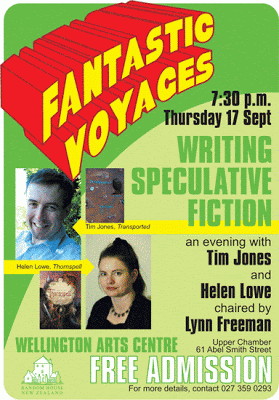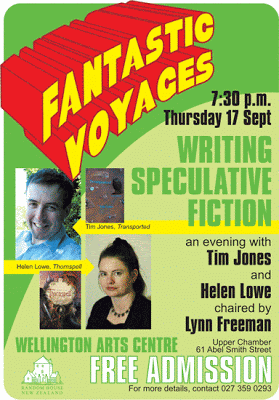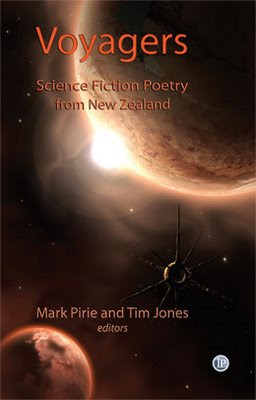This 800-word story appears in my first short fiction collection, Extreme Weather Events (HeadworX, 2001).
The new land was discovered on a Thursday. The Prime Minister addressed the nation. “It’s large,” she said, “and damp, and all ours.” She announced that an expedition was already nearing its northern shores.
The expedition waded ashore and raised the flag in a moving ceremony. The new land was covered in seaweed, mud, and the carcasses of fish. It had a distinctive smell.
The discovery of the new land had significant implications for public policy. An inter-departmental working party was set up, with representatives from all affected Crown entities. Change agents were brought in to build a team culture that would be open, proactive, and outcomes-focused.
The Government welcomed tangata whenua participation. Several tribes had fished in the seas displaced by the new land, and consultative hui were quickly arranged. The participation of the Maori Fisheries Commission Te Ohu Kai Moana, and other stakeholders in the quota allocation process, was subject to pending High Court action.
With the cooperation of public and private service providers, an intensive effort began to map the new land. Global Positioning System data revealed that it had a total surface area of 387 ± 2.5 square kilometres, based on best practice assessments. The majority of the new land was only a few metres above sea level, but there was a gradual rise towards a prominent elevation in the southwestern quadrant, which satellite measurements revealed to be some sixty metres in height. A more accurate figure awaited the arrival of a ground party, which promptly left from Base Camp One.
Together with the composition of the All Black midfield, the new land was the prime topic of conversation over the weekend. Callers to talkback radio were unsure of its potential usefulness, but a prominent life sciences company suggested that it would make an ideal testbed for experiments in plant biotechnology.
On Sunday, the nation was treated to live reports from the party sent to investigate the southwestern elevation. The gradual rise previously reported was crowned by a rocky hill, atop which were strewn large blocks of grey stone. The superficial resemblance of these blocks to construction materials excited worldwide interest. Both print and electronic media carried a number of ill-considered and poorly researched stories making allusions to Atlantis, Mu, and/or Lemuria. The Skeptics Society responded with a strongly-worded statement.
The Government acted decisively to quell speculation. An exclusion zone, to be patrolled by all three services, was established around the hill in question. Any party wishing to land in the area was required to have government permission and pay a substantial fee. It was announced that samples from the quarantine zone would be sent to leading overseas laboratories for analysis, and that results were expected in six to eight weeks.
Sharemarket reaction, which had been muted the previous week, was strongly positive when trading opened on Monday, with the tourism, energy, and telecommunications sectors especially buoyant. Fishing industry shares suffered reverses, however, with analysts pointing to the loss of valuable fishing grounds and the uncertain future of several joint venture arrangements.
Other developments on Monday were primarily institutional in character. The Prime Minister announced that a naming rights sponsor was being sought for the new land. Major corporates, breweries, and communications companies had already expressed interest. On a less positive note, plans by the Tourism Board to brand the new land as an eco-tourism destination came under sustained criticism by environmental groups.
To widespread surprise, the new land slipped beneath the sea just after 5am on Tuesday. Loss of life was averted save for two adventurers who had illegally entered the exclusion zone earlier that night to explore the southwestern elevation. Their Zodiac pilot, who escaped, returned with lurid tales of strange lights in the sky and unearthly noises beneath the hill. These accounts were not corroborated, and the Zodiac pilot was subsequently deported to an undisclosed location.
A planned debate on the new land went ahead when Parliament resumed sitting that afternoon, but its character was much altered. The Prime Minister was put on the defensive by persistent questioning and responded with a blistering attack on the Leader of the Opposition. The disappearance was made worse for the Government because subsequent polling showed that the new land had been especially popular in the key North Island 18-45 male demographic.
After a week in which the new land showed no sign of reappearing, the inter-departmental working party was disbanded and the consultative hui cancelled. Fish stocks over the area were reported to be severely depleted, and the fishing industry pressed the Government for a compensation package. The National Institute of Water and Atmospheric Research was commissioned to conduct a bathymetric survey of the newly-restored sea floor.
The new land is commemorated by two Top 20 singles, an “Assignment” documentary, and a projected TV mini-series which has yet to receive New Zealand On Air funding. A leading authority on the uncanny, now hard at work on a book about the new land, has promised to reveal a scandalous cover-up of dramatic new evidence concerning humanity’s place in the Universe. If these claims are substantiated, they may yet revive public interest in the matter.





